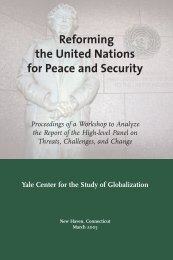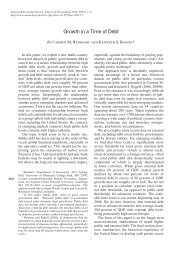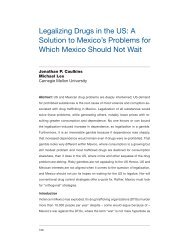The collapse of global trade, murky protectionism, and the crisis:
The collapse of global trade, murky protectionism, and the crisis:
The collapse of global trade, murky protectionism, and the crisis:
Create successful ePaper yourself
Turn your PDF publications into a flip-book with our unique Google optimized e-Paper software.
<strong>The</strong> <strong>collapse</strong> <strong>of</strong> <strong>global</strong> <strong>trade</strong>, <strong>murky</strong> <strong>protectionism</strong>, <strong>and</strong> <strong>the</strong> <strong>crisis</strong><br />
<strong>The</strong>se considerations may well call for reforms to <strong>the</strong> WTO's Dispute Settlement<br />
Underst<strong>and</strong>ing, including potentially exp<strong>and</strong>ing <strong>the</strong> scope <strong>of</strong> sanctions <strong>and</strong> <strong>the</strong> speed<br />
<strong>of</strong> investigations, however, securing agreement on such reforms would take time <strong>and</strong><br />
<strong>the</strong> middle <strong>of</strong> a <strong>global</strong> economic downturn may not be <strong>the</strong> most auspicious time to<br />
launch such an initiative.<br />
<strong>The</strong> <strong>crisis</strong> <strong>and</strong> support for climate change negotiations <strong>and</strong> unilateral<br />
measures<br />
<strong>The</strong> impact <strong>of</strong> <strong>the</strong> <strong>global</strong> economic downturn on firm viability is also reducing <strong>the</strong><br />
momentum behind both <strong>the</strong> climate change negotiations <strong>and</strong> <strong>the</strong> implementation <strong>of</strong><br />
unilateral measures to reduce carbon content, precisely because <strong>of</strong> fears about <strong>the</strong><br />
impact on <strong>the</strong> costs <strong>of</strong> firms that face competition from abroad. Looking forward two<br />
scenarios seem plausible:<br />
• <strong>The</strong> prospects for a comprehensive deal at Copenhagen are seriously weakened<br />
by <strong>the</strong> ongoing <strong>crisis</strong> <strong>and</strong> declining corporate pr<strong>of</strong>itability or,<br />
• <strong>The</strong> pressure for a deal in December 2009 intensifies, <strong>and</strong> along with it <strong>the</strong><br />
protectionist pressure to ensure that any resulting cost disadvantages are at least<br />
matched by steps to shield affected domestic firms from international<br />
competition.<br />
As 2009 unfolds G20 leaders should not become schizophrenic – opposing protectionist<br />
responses to <strong>the</strong> <strong>global</strong> economic downturn, <strong>and</strong> <strong>the</strong>n embracing beggar-thyneighbour<br />
measures to shore up support for a climate change deal. Indeed, policymakers<br />
should be particularly wary <strong>of</strong> traditionally protectionist industries being<br />
"helpful" in <strong>the</strong> run up to <strong>the</strong> Copenhagen conference.<br />
<strong>The</strong> very high price <strong>of</strong> green <strong>protectionism</strong> – A strong climate change<br />
deal<br />
Many G20 leaders say <strong>the</strong>y want a climate change deal <strong>and</strong> expectations in some<br />
quarters are high for <strong>the</strong> Copenhagen summit in December 2009. A climate change<br />
deal would involve <strong>the</strong> introduction <strong>of</strong> complex new taxes <strong>and</strong> schemes with substantial<br />
discretion needed for proper implementation. It is very naïve to think that<br />
developing country governments – whose assent is needed to conclude a climate<br />
change deal – will cooperate if <strong>the</strong>y feel that <strong>the</strong> discretion associated with existing<br />
environmental policies in industrialised countries was misused to shut out imports<br />
during <strong>the</strong> current <strong>global</strong> economic downturn. A developing country veto <strong>of</strong> a strong<br />
climate change deal may well be <strong>the</strong> price <strong>of</strong> <strong>crisis</strong>-induced green <strong>protectionism</strong>. G20<br />
policymakers need to bear this in mind <strong>and</strong> instruct <strong>the</strong>ir government <strong>of</strong>ficials to<br />
implement environmental initiatives in a manner that not only puts foreign firms on<br />
an equal footing with domestic firms but also is seen to do so. Just like o<strong>the</strong>r forms<br />
<strong>of</strong> <strong>murky</strong> <strong>protectionism</strong>, being seen to give equal treatment is almost as important as<br />
granting such treatment in <strong>the</strong> first place.<br />
97





